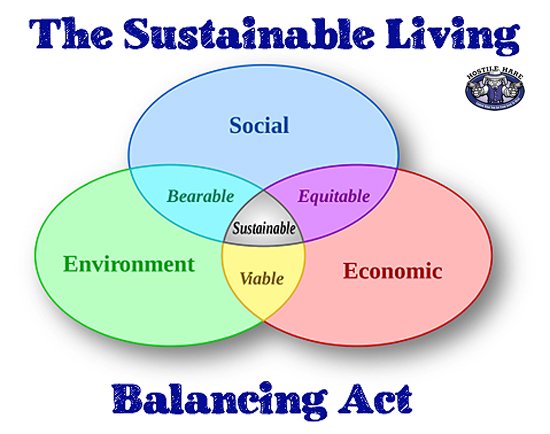The Sustainable Living Balancing Act
I’ll take a wild stab and assume we’d all like to save some money, be socially acceptable and not hurt the environment in the process… That’s not as easy as it sounds. Some of us gravitate towards the fringe of these traits, but most of us agree that being a greedy cheapskate or a non-washing, hemp-wearing hippie or a wasteful, ditsy socialite are not acceptable human conditions. For the most part, we’re comfortable when the actions of others are in the “acceptable center”. So how do we keep ourselves there? This is The Sustainable Living Balancing Act.
 I know that my first response to that question would be, “Who the hell cares what people think.” But we as urban farmers and sustainable living examples should care, and strive to make this lifestyle socially acceptable.
I know that my first response to that question would be, “Who the hell cares what people think.” But we as urban farmers and sustainable living examples should care, and strive to make this lifestyle socially acceptable.
The Venn diagram above was made to explain the green energy dilemma, but I believe it can be applied to sustainable living as well.Personally, I trend towards viable over equitable but with an emphases on CHEAP. I grow my own food, am working on my own power/energy/fuel, and shop local and organic where I can.
The Urban Farm
Growing your own food: Socially acceptable? Sort of… it’s becoming more and more popular and thus more acceptable. But the vast majority of the population thinks that food is someone else’s responsibility and they are less than willing to grow their own. That being said, they generally respect those that do garden and raise livestock in a humane manner.With that in mind, misuse of livestock and irresponsible urban farming can turn a fence-sitter into a homestead enemy. Be mindful of your animals’ waste and noise. Do your best to not upset your neighbors. Try and invite them in on the fun but don’t be too overbearing. True everyone likes fresh eggs, but not everyone likes helping with processing rabbits (found that out first hand). Offer to take your neighbors’ lawn clippings, but don’t compost right next to their fence. You get the idea.
At Home Fuel Production
Biofuels/alternative energy: Socially acceptable? Yes… mostly. We’ve all swiped our card at the pump and watched our dollars drizzle down the drain into the oil and gas pit. Most of us sigh a defeated sigh and do nothing, others dream of burning the gas station down with the “I’ll show them” attitude, and another group walks, rides bikes and carpools…or invents a solution.Making your own biofuels sounds awesome, and it is, but it has its drawbacks. For example; biodiesel is smelly, looks kind of gross and clutters up a backyard with barrels and tanks. In some cases, it can be a fire hazard. It is clean recycled energy though and cheap. It’s worth doing, but be mindful that others may not see your “diamond in the rough”. There are many other options to alternative energy, just keep the downside in mind and do what you can to minimalize it.
Buying Local
And finally local and organic: Socially acceptable? Yes!! You don’t have to get your apples from Washington, or your peaches from Georgia, chances are there’s an orchard near you. Little local farms are always the way to go. The freshest food brought to you at the lowest fuel costs. Now if you got to have your organic food, you’ll pay for it. So there is a threat to the economic side. That being said, there are other benefits that you are paying for.I do believe it is our responsibility to “sell this” to the general population. It’s not just a fad lifestyle that we are treating as a hobby; it’s the answer to some serious problems looming on humanity’s horizon.

